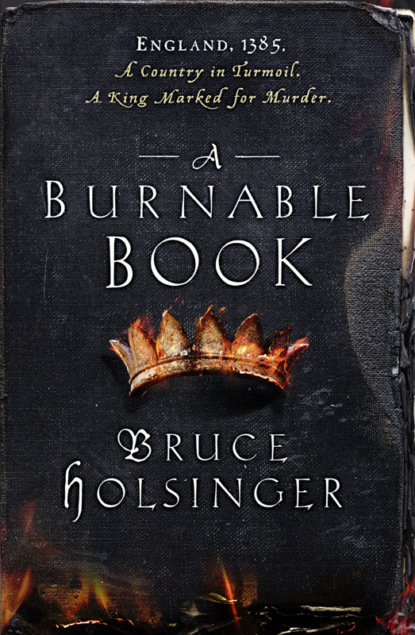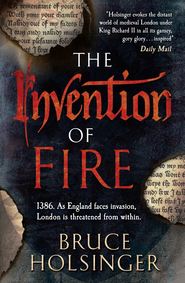По всем вопросам обращайтесь на: info@litportal.ru
(©) 2003-2024.
✖
A Burnable Book
Автор
Год написания книги
2019
Настройки чтения
Размер шрифта
Высота строк
Поля
‘As long as I’m not forced to sample the result,’ said Oxford.
Weldon feigned choking, a comic gesture that broke the awkwardness. ‘I do miss the wines of Italy,’ the knight said, his eyes crinkling with the memories. For years Weldon had served with Sir John Hawkwood before his permanent return to England in the fifth year of Richard’s reign. Weldon was taller than Oxford, and thinner, with a studied casualness to his stance. He wore little in the way of livery, a small badge on his right breast the only mark of his station. ‘Perhaps England’s next war might be fought over France’s vine rather than its cities.’
‘A welcome suggestion,’ I said, choosing to take Weldon’s courteous demeanour as sincere. ‘For that I’d happily lift a sword.’
With these elevated nothings we parted, and I was left wondering what business the earl could possibly have at Fulham. To my knowledge, all Oxford and London shared was a mutual hatred of John of Gaunt.
I was directed to an upper side terrace, reached after a circuitous route through a network of gravel walks. I found the Bishop of London on his knees, thinning roses. At a discreet distance stood two servants bearing bowls, flagons, and gardening tools for the bishop’s use, and, closer, four additional men holding his robes, mitre, and cap: two friars, a canon of some kind, and Fulham’s head gardener, the last with his hands crossed tightly in front of him as Braybrooke assaulted his art with the unpractised hand of a knight shearing sheep. The canon, noticing me, cleared his throat. Braybrooke turned.
‘Gower.’ The bishop was a man of awkward, treeish height; to see him on his knees, his meaty hands scooping dirt from the ground, was something new.
‘Your lordship.’
Braybrooke loosened a stone. ‘How’s Gaunt?’
‘I would not know, your lordship,’ I said. ‘I caught a passing glimpse of him the other week at La Neyte, but that is all.’
Another stone, a spray of soil. ‘Can’t be comfortable for the duke, can it, being a constant object of suspicion?’ I listened as the bishop muttered over the royal troubles of the last year, still the talk of the realm. He had been at the council tournament in February, and I learned a new detail about the aftermath of Oxford’s plot against Lancaster. If not for the peacemaking interventions of Countess Joan, the bishop claimed, either Gaunt or King Richard would surely have been dead by now. And with the king still young, always gullible, and increasingly unpredictable in his alliances, things could only worsen.
‘What about you, Gower?’ the bishop said. ‘You’re content with your own alliances?’
‘I’m for the king, your lordship,’ I said cautiously. ‘From whatever faction he comes, I’m for the king.’
‘An easy vow.’ He packed dirt into the new hole. ‘For a man who takes such stark moral stands in his verse, you’re remarkably reluctant to choose sides.’
My jaw tightened.
‘The lines are being drawn, Gower. Two popes, two churches – some would say two kings.’ The bishop looked up, his eyes cold. ‘Your friend Geoffrey Chaucer, too, would do well to clarify his allegiances. Not a lover of friars, that one.’
I glanced at the two Dominicans. ‘Chaucer is a lover of the good,’ I said. ‘He loves good friars, as he loves good bishops such as your lordship. Good wine, too, and good lawyers.’
Braybrooke barked a laugh. He clipped and dug for a while, then looked up at me again. ‘This book you’re looking for has a name.’
I blinked.
‘You think I’m a fool, Gower? You make a wide-eyed request of Katherine Swynford, the yawningest mouth in the realm, and you expect her not to gossip?’
‘A fair point,’ I conceded.
‘Liber de Mortibus Regum Anglorum.’
‘My lord?’
‘Liber de Mortibus Regum Anglorum. That’s what this work is called.’
‘“The Book of the Deaths of English Kings”,’ I translated.
‘A book of prophecy, written by a certain Lollius during the reign of the Conqueror.’
‘That long ago? What relevance could a book three centuries old have in our day?’
‘The De Mortibus prophesies the death of every English king since William. The houses of Normandy, Plantagenet, with the circumstances of each royal death rendered in detail. The time, the place, the means.’
‘I’ve never heard of this Lollius. Are people taking this seriously?’
‘The book is being read by Wycliffe’s minions, Gower. They gather in conventicles and recite the prophecies one by one. Thirteen kings, thirteen prophecies, thirteen deaths, all foretold and retold as a goad to revolt.’
‘I loathe Wycliffe’s teachings as much as the next fellow, your lordship. But he never questioned Richard’s legitimacy.’
‘I suggest you learn a bit about this book before you dismiss it, Gower. One of my friars here has mingled with the Wycliffites during their readings. He’s got a bit of the work in his head.’ He looked over his other shoulder. ‘Brother Thomas, a taste. The death of King William, if you please.’
One of the friars stepped forward with a bow. At a nod from Braybrooke, he spoke the requested lines.
‘A bastard by birth, of Brittany bane,
A duke rendered king by Deus decree,
With fury so fierce all England will fight,
Shall matins and masses restore to all men,
Then in Mantes to muster his might shall appear.
Unhorsed by his hand this sovereign full hale
On pommel full pounded from saddle shall pitch,
And goeth to ground to giveth the ghost.
At sovereign of swords in death swoon he will,
No more to flee mors, his reign an end make.’
The friar stepped back, assuming his position, still by the tree. Something about the lines sounded familiar.
Braybrooke sat on his heels, prompting the gardener to step forward hopefully. The bishop waved him off. ‘Thus shall die the first of thirteen English kings.’ Braybrooke wiped his brow. ‘Let me correct myself: thus did die the first of thirteen English kings, this one at the great battle at Mantes, of which we read in our chronicles.’
‘Of which this Lollius read in our chronicles, unless I’m an utter fool,’ I muttered, unswayed by the bishop’s lofty tone.
He glared at me. ‘If you’re sceptical, Gower, keep listening.’ He nodded to the friar, who began a second series of lines.
‘With seven of swords to swing at their will,
To chasten with chattel, and chase their king down.
In Gloucester will he goeth, to be gutted by goodmen
With rod straight of iron, in arsebone to run.






